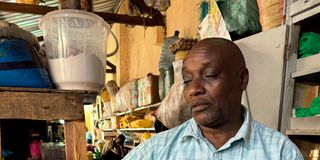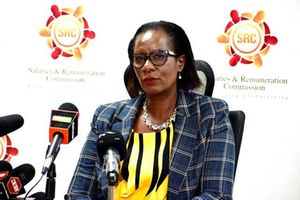Job Macharia: Man with the golden arm saving lives one drop at a time

Job Macharia, a businessman in Eldoret, displays his blood donation cards. He has donated blood 138 times, making him one of the top blood donors in the country.
What you need to know:
- Kenya relies heavily on donors to advance its campaigns on blood drives and collections; with a staggering 1,100 patients needing blood every single day, as revealed by the 2022 Kenya Tissue and Transplant Authority performance audit report.
- Notably, 60 per cent of donated blood goes towards pregnant mothers and children facing birth-related complications.
At the very edge of Eldoret’s bustling main market stands Job Macharia, a 52-year-old stall owner selling packaging papers and groceries. Tucked away on one of the shelves are seven blood donation booklets. Each crisp, now slightly worn out, booklet holds a number of dates. The combined total across all the booklets is 138 entries of blood donations.
"He is one of the country’s top blood donors and the highest in the North Rift region,” says Thomas Rotich, North Rift manager at Kenya Tissue and Transplant Authority (KTTA).
For close to three decades, Job has adhered to one specific schedule: after every three months, he gives a pint of his lifeblood. Blood is a life-sustaining connective fluid composed of platelets, plasma and cells, and is the very essence of life. It delivers nutrients and oxygen to our cells and removes metabolic waste from the cells. Yet, it can be lost due to accidents, haemorrhages or medical procedures.
According to the World Health Organization (WHO), about 118.54 million blood donations are collected worldwide annually. Forty per cent of these are collected in high-income countries, home to 16 per cent of the world’s population. However, this is still below the required supplies.
Kenya relies heavily on donors to advance its campaigns on blood drives and collections; with a staggering 1,100 patients needing blood every single day, as revealed by the 2022 Kenya Tissue and Transplant Authority (KTTA) performance audit report. Notably, 60 per cent of donated blood goes towards pregnant mothers and children facing birth-related complications.
According to recommendations by WHO, a country should collect a unit of blood from at least one per cent of its population every year. During the period 2016/2017-2018/2019, KNBTS missed the annual targets by 40,922 units of blood.
Many Kenyans have witnessed their own or a loved one’s life-determining need for blood, platelets or plasma.
“I don’t even need to keep a meticulous record of when I require to go next. It is something that I don’t forget,” shares Job. Yet, it is unlikely common to see this kind of determination and the “why do you donate question’ is one that Job has heard all too often, asked in different forms.
How it all started
The first time Job donated blood was back when he was in his early 20s. “It was a mere happenstance,” he reveals. A young man, just starting out, was searching for any work he could find when he stumbled upon a harrowing scene: a woman writhing in pain by the roadside. “I offered to help accompany her to the hospital and when we got there, doctors informed us that she required a blood transfusion. After a quick questionnaire to assess my suitability, I found myself making my very first blood donation,” he says.
The memory of the woman’s vulnerability sparked a fire within Job and he began to do the frequent donations.
“With that experience in my 20s, I witnessed first-hand what could happen if one doesn’t get immediate access to compatible blood or if there is no enough blood in the hospitals,” he shares. In 2013, the father of eight rallied a few of his friends to form “Lib Blood”, a group dedicated to mutual encouragement for blood donation.
“Our mission was to ensure that no one in our community or in any other parts of the country faced the desperate wait for blood. We would not only check on one another but also used the group to share calls for blood donations across the country,” he explains.
In 2017, however, following the clashes that accompanied the repeat general election, the group disintegrated and only a few of them live in Uasin Gishu County. “Although the group is not very active now, we are all encouraging blood donations in our individual capacities. In fact, I actively encourage people here at the market, and two vendors are dedicated donors who respond whenever there’s a need,” he says.
Notably, Job is not paid for his efforts. He only receives sporadic honorariums from organisations with whom he partners with for blood drives but likens his volunteering to an offering. “I may not be able to offer money to people or extend some other form of help, but I am in a position to donate blood so I will continue to do it,” he shares.





